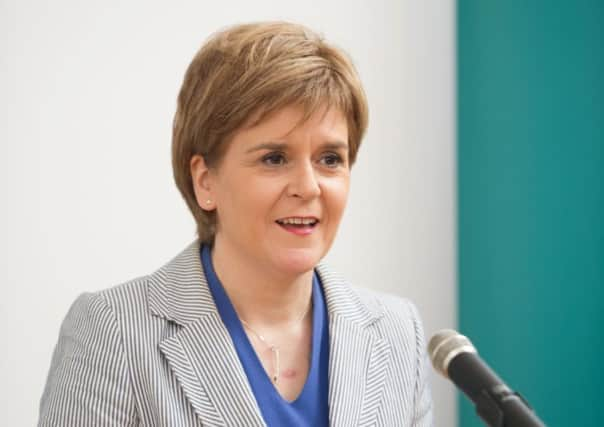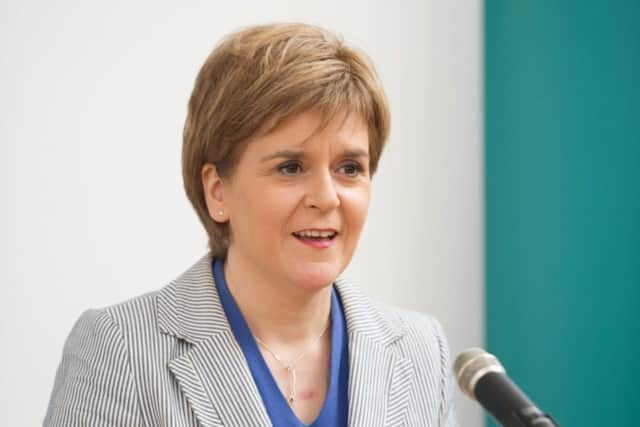Nicola Sturgeon: Judge me on education record


The First Minister told education leaders in a keynote speech yesterday this will be her “priority” during her time in office.
Ms Sturgeon added: “Let me be clear – I want to be judged on this. If you are not, as First Minister, prepared to put your neck on the line on the education of our young people then what are you prepared to. It really matters.”
Advertisement
Hide AdAdvertisement
Hide AdThe SNP leader unveiled plans to introduce standardised testing for primary pupils and revealed that dozens of new schools are to benefit from a £100 million government fund aimed at driving up attainment levels.


Labour’s new leader in Scotland Kezia Dugdale has already pledged to put the education gap between rich and poor areas at the heart of next year’s Holyrood election campaign. Yesterday Ms Sturgeon admitted that the situation was “unacceptable”.
During a speech at Wester Hailes Education centre in Edinburgh she said that her aim was to “close that attainment gap completely.”
Ms Sturgeon added: “My priority for my time as First Minister – and let me be clear I want to be judged on this – is that every young person should have the same advantage that I had when I was growing up in Ayrshire.
“They should know that if they have the talent and work hard enough, they will be able to fulfil their potential.”
Despite rising standards across schools in Scotland, statistics show that students in more affluent areas are twice as likely as those in poorer areas to get at least one Higher.
Last night the First Minister’s political opponents laid the blame for failures in education at the door of the SNP ministers, who have been in power since 2007.
Advertisement
Hide AdAdvertisement
Hide AdLiz Smith, the Scottish Conservatives’ education spokeswoman, described the SNP’s education record as “a miserable failure”.
She said: “When they see falling rates of literacy and numeracy, a widening attainment gap between rich and poor, cuts to teacher numbers and 140,000 fewer colleges places, they know something is badly wrong and the blame lies entirely at the door of the Scottish government.”
Her party leader, Ruth Davidson, said: “This lands squarely at the SNP’s door.”
Scottish Labour’s education spokesman, Iain Gray, said the current attainment gap was “unacceptable” and welcomed Ms Sturgeon’s plans to address the issue, but added: “She needs to get on and do it.”
The First Minister is expected to unveil a new national framework for testing in primaries when she publishes her Programme for Government in two weeks time.
She confirmed the results of the testing would be made public, meaning they could be used to create school league tables, although the government would not use them for this purpose.
The majority of Scotland’s local authorities already use some form of assessment to judge pupils’ progress, but different systems means building a national picture of attainment is difficult.
Currently 30 out of 32 councils use standardised assessment for primary and lower secondary pupils.
Advertisement
Hide AdAdvertisement
Hide AdMs Sturgeon said: “Standardised assessment helps teachers – it provides useful information to support their own judgment of children’s progress.
“But many local authorities use different systems. That makes it much more difficult – it makes it pretty near impossible – to get a clear and consistent picture of progress. That’s why we are now developing a national improvement framework.”
But the move met with a frosty response from union leaders.
EIS general Secretary Larry Flanagan said: “A return to a national system that uses standardised tests in primary schools as a benchmark is untenable and would do nothing to raise standards.
“We remain opposed to any suggestion of a national testing system which would inevitably lead to teaching to the test and the construction of flawed and misleading league tables.”
The First Minister’s pledge came as fresh data from university admissions body UCAS showed that just 9.7 per cent of those from the most disadvantaged areas in Scotland have been accepted to university so far this summer, compared to 17 per cent in England and 13.9 per cent in Northern Ireland.